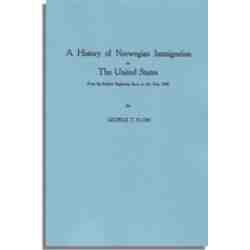This is the standard work on the first phase of Norwegian immigration to the United States. In forty-two chapters, Professor Flom lays out the establishment of every significant Norwegian settlement in America prior to the revolutionary year 1848. While the volume recounts isolated instances of Norwegian pioneers prior to 1825, the story starts in earnest with the settlement of Orange County, New York by Norwegian Quakers, the so-called “Sloopers.” Most of the 19th-century Norwegians were from the districts of Stavanger, Haugesund, Ryfylke, Voss, Upper Telemarken, and West Numedal. Flom then follows the settlers as they begin to dot the countryside of the Midwest, to communities like Fox River and Beaver Creek, Illinois; Koshkonong and Blue Mounds, Wisconsin; and Clayton and Allamakee counties, Iowa. In the process, the author enumerates the names of hundreds of hardy Norwegian pioneer families who led their nation’s exodus to America. Occasionally the story departs from the chronological narrative to discuss the causes for the migration, which for the most part relate to the paucity of arable soil in Norway, heavy taxation, and, in the cases of Norwegian Quakers, Moravians and other denominations, the quest for religous toleration. We also learn about the cost of the transoceanic voyage and the quality of the newcomers’ life in America. Finally, the author has provided a helpful bibliography and a number of tables that illustrate the distribution of Norwegian-Americans throughout the country.
A History of Norwegian Immigration to the United States
from the Earliest Beginning down to the Year 1848
Publication Date: 1909
Reprint Date: 2004
Pages: 389 pp.
Price range: $25.95 through $47.00
-
Description
-
Additional information
Format Printed For Your Order Illustrated Period Region Subject Vendor


